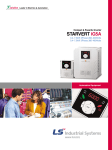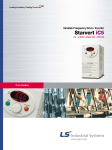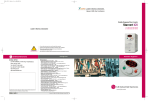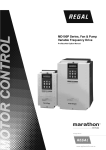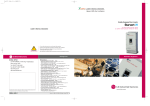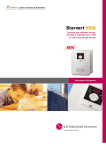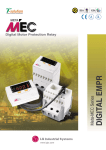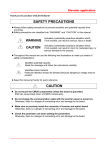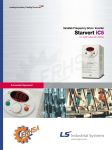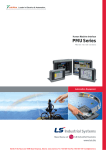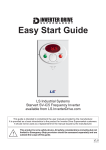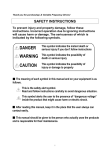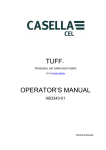Download Starvert iV5
Transcript
Leader in Electrics & Automation St ar ver t iV5 High Precision &Torque Control LG Vector Inverter 5.5~37kW 3 Phase 200~230V, 5.5~220kW 3 Phase 380~460V Automation Equipment "" The The optimum optimum solution solution "" The The vector vector control control LG LG Starvert Starvert iV5 iV5 series series provides provides aa full full satisfaction satisfaction for for all all the the needs. needs. ‘We guarantee, your satisfaction Will be beyond your expectation’ LG Starvert iV5 series realizes the high precision vector control in entire operational area and its highly precise speed control guarantees a superb control stability in the elevator controls. 06 Model & Type 05 Features 09 Wiring 07 Standard Specification 13 I/O Board 11 Terminal Function 15 Shifts between each groups and codes in the Loader 14 Loader Use 24 Braking Unit and Resistor 16 Function Codes Table 28 Fault Solution and Check 26 Dimension 29 Basic configuration LG starvert iV5 series features the versatile and user-friendly interface and extended functional innovation. "LG inverter is to be evolved through our state-of-the-art technologies from now on" Features Autotuning In the application which requires a high torque at low speed, the electrical parameters of motor should be properly set for an optimal operation. LG Vector Controlled Inverter of iV5 has two types of autotuning, which are standstill type and rotation type, respectively. LG Inverter iV5 Series ■ Standstill type Autotuning This unique technology of LG allows the autotuning operation to be performed even with the motor shaft directly connected to the load. Especially, this standstill type autotuning is very useful in the lift application because it does not require removal of brake coupling connected to the motor. ■ Rotation type Autotuning This type of autotuning has been widely used for the vector control inverter. As the name implies, this requires the motor shaft to be free of the coupling for a proper operation. Various communication interfaces iV5 provides various communication interface such as RS 485, DeviceNET, Profibus-DP and Modbus-RTU. When LG PLC is used as an upper level controller, it can be easily interfaced to the iV5. Extended function card (ENC_DIV,DIAO and ELIO) Option card for the encoder pulse division (ENC_DIV) supports the encoder with open collector output and can divide the encoder pulse up to 1/128. Digital input and Analog signal output card (DIAO) can receive the binary speed command from PLC or other upper level controller and has 4 channels of analog signal output. ELIO card enables the lift application software to be available for an optimized lift operation. Standard compliances All starvert iV5 series comply with cUL and UL (Type1) standards. 05 Model & Type Applicable Motor ranges 200V Series 400V Series 5.5kW (7.5HP) SV055iV5-2DB SV055iV5-4DB 7.5kW (10HP) SV075iV5-2DB SV075iV5-4DB 11kW (15HP) SV110iV5-2DB SV110iV5-4DB 15kW (20HP) SV150iV5-2DB SV150iV5-4DB 18.5kW (25HP) SV185iV5-2DB SV185iV5-4DB 22kW (30HP) SV220iV5-2DB SV220iV5-4DB 30kW (40HP) SV300iV5-2DB SV300iV5-4 37kW (50HP) SV370iV5-2DB SV370iV5-4 45kW (60HP) SV450iV5-4 55kW (75HP) SV550iV5-4 75kW (100HP) SV750iV5-4 90kW (120HP) SV900iV5-4 110kW (150HP) SV1100iV5-4 132kW (175HP) SV1320iV5-4 220kW (300HP) SV1600iV5-4 SV2200iV5-4 Inverter type Input power specification Rated capacity Output power specification Operation frequency and rated output Bar-code Serial number Displays if DB circuit is built in Input voltage specification STARVERT Maximum applicable motor capacity iV5 Series 06 Standard Specification � 200V Class Specifications Type : SV[ ][ ][ ]iV5-2(DB) 055 075 110 150 185 220 300 370 10 15 20 25 30 40 50 Maximum applicable [HP] 7.5 motor ranges [kW] 5.5 7.5 11 15 18.5 22 30 37 Capacity[kVA] * Note2) 9.1 12.2 17.5 22.5 28.2 33.1 46 55 Rated current [A] 24 32 46 59 74 87 122 146 * Note1) Rated output Output speed 0 ~ 3600rpm (Vector control) Output voltage 200 ~ 230V * Note3) Voltage Rated input 3∅ 200 ~ 230V (-15% ~ +10%) Frequency Weight [Kg(Ibs)] 50 ~ 60Hz (±5%) 14(31) 14(31) 28(62) 28(62) 28(62) 28(62) 43(93) 43(93) 055 075 110 150 185 220 300 370 � 400V Class Specifications Type : SV[ ][ ][ ]iV5-4(DB) Maximum applicable [HP] 7.5 10 15 20 25 30 40 50 motor ranges [kW] 5.5 7.5 11 15 18.5 22 30 37 Capacity[kVA] 9.1 12.2 18.3 22.9 29.7 34.3 46 57 Rated current [A] 12 16 24 30 39 45 61 75 Rated output Output speed 0 ~ 3600rpm (Vector) Output voltage 380 ~ 460V * Note3) Voltage Rated input 3∅ 380 ~ 460V (-15% ~ +10%) Frequency 50 ~ 60Hz (±5%) Weight [Kg(Ibs)] 14(31) 14(31) 28(62) 28(62) 28(62) 28(62) 45(99) 45(99) Type : SV[ ][ ][ ]iV5-4(DB) 450 550 750 900 1100 1320 1600 2200 Maximum applicable [HP] 60 75 100 120 150 175 215 300 motor ranges [kW] 45 55 75 90 110 132 160 220 Capacity[kVA] 70 85 116 140 170 200 250 329 Rated current [A] 91 110 152 183 223 264 325 432 Rated output 0 ~ 3600rpm (Vector) Output speed 380 ~ 460V * Note3) Output voltage Rated input 3∅ 380 ~ 460V (-15% ~ +10%) Voltage 50 ~ 60Hz (±5%) Frequency Weight [Kg(Ibs)] 63(139) 63(139) 68(150) 98(216) *Note1) It represents the output capacity 05 maximum applicable motor in case LG-OTIS 4pole motor is used. *Note2) Rated capacity ( = √ 3VI) is calculated based on 220V for 200V class, 440V for 400V class. *Note3) Maximum output voltage cannot be generated greater then specified input voltage. 07 98(216) 122(269) 122(269) 175(386) Standard Specifications � Common Specifications Item Specification Circuit type Control type Frequency / Speed control accuracy Frequency / Speed resolution Control Response speed Vector torque control V/F Speed ACC/DEC Open loop control: V/F control (90-220kW) Analog: ± 0.2% of maximum command speed (25±10℃) Digital: ±0.01% of maximum command speed (0~40℃) Analog: ±0.05% of maximum command speed Digital: 0.01% of maximum command speed 50Hz 3% V / F pattern Linear, Square, User V/F torque Boost Manual torque boost(0-20%), Automatic torque boost Time setup 0.00-6000.0 sec (Time unit can be set) Combination 4 combined of Acc/Dec eleration time Pattern Braking type Braking IGBT adopted voltage type inverter Speed sensor use vector type control Linear, S-Curve Dynamic braking using external resistor Braking torque 150% Braking resistor An external braking resistor is required Digital setting Speed setting Multi-step-speed setup by digital input Analog input setting of -10~10V or 4~20mA Setting by options 3Channels (AI1, AI2, AI3) Input Analog input -10 ~ 10V, 4 ~ 20mA, 10 ~ 0V, 20 ~ 4mA, motor NTC (selectable) Selectable among 9 different multi-function analog inputs FX, RX, BX, RST, P1 ~ P7 Digital input Multi function input terminal (P1~P7) can be selected among 27 functions. 2-Channel (AO1, AO2) Analog output -10 ~ 10V output Selective among 31 multi-function analog output functions Output Multi function digital output: 2channels (1A-1B, 2A-2B) Digital output Open collector output Fault digital output: 1channel (30A-30C, 30B-30C) 1channel (OCI/EG) Over current, Over/Low voltage, Inverter overheat, Inverter thermal sensor open, Protection function Motor over heat, Motor thermal sensor open, Over speed, IGBT gate blocking (BX), Fuse open, Trip by unusual external signal, Encoder error, Communication error, Electronic thermal, Stall prevention (V/F), Over load(V/F), Inverter over load Installation environment Ambient temperature Environment Ambient humidity Cooling method Altitude / Vibration Indoor, free of corrosive gas and direct sunlight -10 ~ 40C (Non frozen condition) Below RH90% (Dew free) Forced cooling by FAN Below 1000 meters/ above sea level 5.9㎨ (=0.6G) 08 Wiring SV 055, 075, 110, 150, 185, 220 iV5-2(DB) SV 055, 075, 110, 150, 185, 220 iV5-4(DB) Brake resistor(option) MCCB ACR MC B1 B2 R V S 24V Fault reset Multi function input G G Forward run/Stop command Reverse run/Stop command Emergency stop RX Multi function input7 Common terminal P7(MCC) CM PE Common terminal 5G A+ A- Encoder B Phase input BX RST P1(MM0) P2(MM1) Supply power Encoder A Phase input FX Multi function input1 Multi function input2 Multi function input3 Multi function input4 Multi function input5 Multi function input6 RA Open collector output P3(ATO) P4(FHM) P5(BAT) P6(BRC) GE RB Analog input(-10V~10V) (4~20mA) (0V~10) (4~20mA) Motor NTC Analog input1 Analog input2 Analog input3 Common terminal VREF AI1 AI2 E Encoder output-A Phase Encoder output common terminal GE AO1 Analog output1 AO2 5G Analog output2 Common out Multi function digital output (~AC 250V, 1A) (~DC 30V, 1A) 2A 2B OC1 EG Note ●: Power terminal ○: control terminal 09 Analog output (-10~10V) Fault digital output (~AC 250V, 1A) (~DC 30V, 1A) 30A 30C AI3 5G Encoder( line drive) Encoder output-B Phase Encoder output common terminal 1A 1B Standard voltage Shielded cable B+ B- 30B Variable resistor 10㏀, 1/2W IM W T 3phase AC input (220V/440V 50/60Hz) U Multi function open collector output (24V, 50mA) Wiring SV300, 370iV5-2 SV300, 370, 450, 550, 900, 1100, 1320, 1600, 2200iV5-4 Brake unit (option) B2 G Brake resistor( option) P/B1 N Short part MCCB ACR MC P1 P2 N U R V S W T 3Phase AC input (220V/440V 50/60Hz) Supply power PE Common terminal 5G A+ AB+ B- 24V Emergency stop Fault reset Multi function input G G Forward run/Stop command Reverse run/Stop command Multi function input1 Multi function input2 Multi function input3 Multi function input4 Multi function input5 Multi function input6 Multi function input7 Common terminal FX RX BX RST P1(MM0) P2(MM1) P3(ATO) P4(FHM) P5(BAT) P6(BRC) P7(MCC) CM Encoder A phase input Encoder B phase input Open collector output Analog input(-10V~10V) (4~20mA) (0V~10) (4~20mA) Motor NTC Analog input1 Analog input2 Analog input3 Common terminal VREF AI1 AI2 E RA Encoder output-A Phase Encoder output common terminal RB Encoder output-B Phase GE Encoder output common terminal AO1 Analog output1 AO2 Analog output2 5G 30A Common out Multi function digital output (~AC 250V, 1A) (~DC 30V, 1A) 2A 2B OC1 AI3 5G EG Note) ●: Power terminal ○: control terminal 10 Analog output (-10~10V) Fault digital output (~AC 250V, 1A) (~DC 30V, 1A) 30C 1A 1B Standard voltage Encoder (Line drive) shielded cable GE 30B Variable resistor 10㏀, 1/2W IM Multi function open collector output (24V, 50mA) Terminal Function � Power Terminal Display Description Name 3Phase AC input connection R, S, T 1) 200V: 200~230V, 50/60Hz AC Input 2) 400V: 300~460V, 50/60Hz U, V, W output Cable connection of 3 phase induction motor G Earth Inverter frame earth terminal B1, B2 Braking resistor Braking resistor connection P1, P2 DC reactor and Braking unit DC reactor, braking unit and DC link common connection terminal P DC Link(+-) terminal DC Link common connection terminal N DC Link(-) terminal Braking unit and DC link common terminal � Control Circuit Terminals Item Display Name FX Forward run command ● "ON" when tied to CM terminal RX Reverse run command ● Stops when FX and RX are ON/OFF simultaneously RST Fault reset P1(MMO) Description ● Clears the fault condition only when the fault state is removed ● Selectable among the following 27 functions: (Multi step speed selection 1/2/3, JOG run, MOP up/down/Save/Clear, Analog hold, Digital input Main drive, Second function, Speed Acc/Dec time selection, 3-wire operation, External default signal B contact point, Forward rotation prevention, Process PI disable, Timer input, Soft start cancellation, ASR PI Gain selection, ASR P.PI selection, Flux reference selection, Pre-excitation, Speed/Torque control selection, CM Torque limit use, Torque bias VREF COMMON ● "ON" in case of connection between CM and digital AI1 Analog setting power ● Variable resistor use standard voltage(+10V):10㏀ ● Voltage input(-10~10V), current input(4~20mA) voltage input AI2 Current input The motor NTC input is selectable ● Selectable among following 9 functions; (Speed reference, Torque reference, Torque bias, Torque limit, Process PI control reference, Process PI controller feedback, Draw reference, Motor NTC input) Analog input ● Jumper set up use AC voltage input � AI1, AI2: Open , AI3:Left of switch ● Jumper set to use as voltage input voltage input AI3 Motor NTC input � AI1,AI2: Short ● With motor NTC( OTIS-LG Motor) input, switch direction setup � AI3: Right of switch 5G COMMON ● Analog input COMMON terminal 11 Terminal Function � Control Circuit Terminals PE 5G A+ AEncoder Input Encoder output Description Name Classification Display Encoder power Encoder A phase signal B+ BPE 5G PA PB RA GE RB GE AO1 Encoder A phase signal Encoder B phase signal Encoder output-phase A Encoder output common terminal Encoder output-phase B Encoder output common terminal Analog output1 AO2 Analog output2 5G 1A 1B 2A 2B OC1 EG 30A 30B 30C COMMON Encoder B phase signal Encoder power +5V Line drive power(Jumper set required) 0V ● A and B phase signals of line drive encoder ● To use the line drive type encoder, the "P5 pin" of I/O PCB JP2 should be shorted and then the JP1 switch should be pulled down to "LD" direction ● Jumper setup (factory default) +15V Open collector power (Jumper setup is required) 0V ● A and B phase signals of complementary and open collector type signals ●Short the "P15 pin" of I/O PCB JP2 and then pull up the JP1 switch to "OC" ● Encoder phase A and B output signal (Open collector type) ● Output -10V~+10V ● Selection among following 31 items; Analog Output Digital Output (Motor speed, Speed reference1~2, Torque reference1~2,Torque current volume Flux reference, Flux reference volume, Inverter output current, Inverter output voltage, Motor temperature, DC voltage..) ● COMMON terminal for analog output Multi function digital output1(contact point A) ● Selectable among following 14 items; ( Zero speed detection, speed detection(polarity valid), speed detection(rotation direction invalid), Speed reach, Multi function digital output2(contact point B) Speed matching, arbitrary torque detection Torque limit feature, Motor overheating signal, Inverter overheating signal, Low voltage feature, Inverter run signal, Inverter Multi function open collector output regeneration signal, Inverter run function, Timer output) Fault signal A contact point Fault signal B contact point COMMON ● Activates when the faults occur ● Not available in emergency stop ● Common for A and B digital output � Control Circuit Terminal Control Terminal Feature ● Control Terminal Panel Arrangement(Standard Type(SIO) - Non insulated type) 12 I/O Board 1) Encoder wiring and Jumper setup (+15V Complementary or Open collector) +15V Open collector +15V Open collector I/O PCB version : V1.0 I/O PCB version : V2.0 2) Encoder wiring and Jumper setup (+5V Line drive) +5V Line drive +5V Line drive I/O PCB version : V1.0 I/O PCB version : V2.0 3) Analog Input Jumper setup (Voltage/ Current/ Motor NTC inputs) A/1,A/2 Voltage input: Open Current input: Short A/1,A/2 Voltage input: Open Current input: Short A/3 Switch Voltage input: Left Motor NTC input: Right A/3 Switch Voltage input: Left Motor NTC input: Right I/O PCB version : V1.0 I/O PCB version : V2.0 ●Do not change the jumper set for the encoder type during operation. The Jumper type change during operation results in a serious system damage. Jumpers should be set properly before the inverter operation. Warning ●The NTC input of the analog input 3(AI3) is only available with OTIS-LG motors. Use of different type of NTC may cause the motor damage due to overheating. 13 Loader Use � Data and status display � Data set up start � Shift between function groups � Shifting from group code to the upper code � Data set up completion � Decimal point shift � Only available in case of data setup � Function code shift � Shift to next function code � Data increase in set up mode � Forward run command key � Only available with loader operation � LED is turned on with forward operation � Blinks during Acc/Deceleration of forward operation � Reverse run command key � Only available, with loader operation � LED is turned ON with reverse run � Blinks during Acc/Deceleration of reverse run � Stop command � Available with the loader operation � LED is turned on when inverter stops its operation � Blinks when fault occurs � Reset � Fault reset � Shift to function code � Shift to previous code � Data is decreased in set up mode � Loader Use Instruction Classification KEY Display Function Name MODE Mode Key PROG ENT ▲ (up) ▼ (down) Shift/ESC REV STOP/RESET FWD Program Key Enter Key Up Key Down Key Shift/ESC Key Reverse run Stop/Reset Key Forward Key (REV) Reverse run key (STOP/RESET) Stop/Fault display (FWD) Forward Run Display LED Function shift between groups. shift from a group code to upper code. Parameter setting value change. Saving altered setting values. Shift between codes and increase the parameter value. Shift between codes and decrease the parameter value. In case of set up mode, it is operated with the shift key. Operation with ESC key in non-set up mode. Reverse run key. Stop key when inverter is on operation. Forward run key. Turns on at reverse operation. Blinks while the inverter is on Acc/Deceleration and then turns on the constant speed operation. Turns off when inverter stops operation. Blinks when fault occurs. Turns on during forward operation. Acc/Deceleration running modes blink the lamp and it is turned on in the forward operation. 14 Shifts Between Each Groups and Codes in the Loader � Shifts between each groups and codes in LCD loader The [MODE] key is used for transfer to the other group and the [▲UP] and the [▼down] keys are used to move up and down in the same group. Display group I/O group Parameter group ● The user group and the second group are omitted between shifts of each group. 15 Function group Control group Function Codes Table � Display Group�DIS_[[ ] [ ] � DIS Group Code No. Code Name DIS_00 Motor speed/Control mode Actual torque/current DIS_01 User selection display 1 DIS_02 DIS_03 DIS_05 User selection display 2 User selection display 3 Process PID output Ref / FB Fault feature display DIS_06 User group display setup DIS_04 LCD Display Message 0.0rpm SPD Tq 0.0% 0.0A Ai1 Value Ai2 Value Ai3 Value PreRamp Ref PostRamp Ref ASR Inp Ref Output freq Motor Speed Speed Dev ARS Out Torque Bias Torque Limi Torque Ref IqeRef Iqe Flux ref Ide ref Ide ACR_Q Out ACR_D Out VdeRef VqeRef Out Amps RMS Out Volt RMS Power DC Bus Volt Proc PI Ref Proc PI F/B Proc PI Out Mot Temp Inv Temp Inv i2t Inv it MP Output Ctrl Mode S/W Version Run Time Terminal In Terminal Out Run Status Refer to DIS_01 Refer to DIS_01 PIDOut 0.0% * xx.x% 0.0% Faults Usr Grp Disp *Note1) Parameter set up possibility during inverter operation (Yes: Set up allowed No: Set up not allowed) 16 Range Setting Data Unit % % % rpm rpm rpm rpm rpm rpm % % % % A A % A A V V V V A V kW V % % % deg deg % % % Not used Dis+User Grp Display ALL *Note1) Default R PreRamp Ref Yes DC Bus Volt Terminal In Yes Yes Not used Yes � I/O Group�I/O_[[ ] [ ] � I/O Group Code No. I/O_00 I/O_01 I/O_02 I/O_03 I/O_04 I/O_05 I/O_06 I/O_07 I/O_08 I/O_09 I/O_10 I/O_11 Code Name Function code selection Definition of multi-function input terminal P1 Definition of multi-function input terminal P2 Definition of multi-function input terminal P3 Definition of multi-function input terminal P4 Definition of multi-function input terminal P5 Definition of multi-function input terminal P6 Definition of multi-function input terminal P7 Reverse operation of multi-function input terminal LPF time constant of terminal input Reverse run of multi-function input terminal Definition of multi-function analog input Ai1 LCD Display Message Jump Code P1 Define P2 Define P3 Define P4 Define P5 Define P6 Define P7 Define Neg Function Terminal LPF Neg Function, Out Ai1 define 17 Range 1 ~ 7.5 Not used Speed-L Speed-M Speed-H Jog Speed Mop Up Mop Down Mop Save Mop Clear Analog Hold Main Drive 2nd Func Xcel-L Xcel-H 3-Wire Ext Trip-B Prohibit FWD Prohibit REV Proc PID Dis Timer Input SoftStrtCncl ASR Gain Sel ASR P/PI Sel Flux Ref Sel PreExcite Spd/Trq Sel Use Max Trq Use Trq Bias Refer to I/O-01 Refer to I/O-01 Refer to I/O-01 Refer to I/O-01 Refer to I/O-01 Refer to I/O-01 0000000 ~ 1111111 Setting Data Unit R Yes bit 0 ~ 2000 00000~ 11111 Not used Speed Ref Proc PID Ref Proc PID F/B Draw Ref Torque Ref Flux Ref Torque Bias Torque Limit Default bit Not used No Not used No Not used No Not used No Not used No Not used No Not used No 0000000 No 5 Yes 00000 No Not used Yes Yes Yes Yes Yes Yes Yes Yes Yes Function Codes Table � I/O Group�I/O_[[ ] [ ] � I/O Group Code No. Code Name LCD Display Message I/O_12 Definition of multi-function analog input Ai1 Ai1 Source I/O_13 I/O_14 I/O_15 I/O_16 I/O_17 I/O_18 I/O_19 I/O_20 I/O_21 I/O_22 I/O_23 I/O_24 I/O_25 I/O_41 I/O_42 I/O_43 Gain of multi-function analog input Ai1 Bias of multi-function analog input Ai1 Time constant of multi-function analog input Ai1 Definition of multi-function analog input Ai2 Type definition of multi-function analog input Ai2 Gain of multi-function analog input Ai2 Bias of multi-function analog input Ai2 Time constant of multi-function analog input LPF Ai2 Definition of multi-function analog input Ai3 Type definition of multi-function analog input Ai3 Gain of multi-function analog input Ai3 Bias of multi-function analog input Ai3 Time constant of multi-function analog input Ai3 Definition of multi-function auxiliary output terminal AX1 Definition of multi-function auxiliary output terminal AX2 Definition of multi-function auxiliary output terminal OC1 Range -10~10V 4~20mA 10~0V 20~4mA 0.00~250.00 Setting Data Unit Default R -10~10V Yes % 100.00 Yes % 0.00 Yes ms 0 Yes Not used Yes -10~10V Yes 100.00 Yes 0.00 Yes Ai2 LPF 0 Yes Ai3 Define Not used Yes -10~10V Yes 100.00 Yes 0.00 Yes 0 Yes Not used Yes Not used Yes Not used Yes Ai1 Gain Ai1 Bias Ai1 LPF 100.00 ~ Ai1 Gain 0 ~ 2000 Ai2 Define Ai2 Source Ai2 Gain Ai2 Bias Ai3 Source Ai3 Gain Ai3 Bias Refer to I/O_10 ~ I/O_15 Refer to I/O_11 ~ I/O_15 (I/O_20: motor NTC selectable) Ai3 LPF AX1 Define AX2 Define OC1 Define Not used INV Ready Zero Spd Det Spd Det. Spd Det(ABS) Spd Arrival Timer Out LV Warn Run Regenerating Mot OH Warn Inv OH Warn Spd Agree Trq Det. Trq Lmt Det. Equal to I/O_40 Equal to I/O_40 I/O_46 Fault relay mode (A,B,C terminals) Relay Mode 000 ~ 111 bit 011 Yes I/O_47 I/O_48 I/O_49 I/O_50 I/O_51 Zero speed detect level Zero speed detect band Arbitrary Speed detect level Arbitrary Speed detect band Detect band of speed reach ZSD Level ZSD Band SD Level SD Band SA Band 0.0 ~ 480.0 0.1 ~ 10.0 -3600 ~ 3600 0.1 ~ 10.0 0.1 ~ 10.0 rpm % rpm % % 10.0 0.5 0 0.5 0.5 Yes Yes Yes Yes Yes 18 � I/O Group�I/O_[[ ] [ ] � I/O Group Code No. I/O_53 I/O_54 I/O_55 I/O_56 I/O_57 I/O_58 I/O_59 I/O_60 I/O_61 I/O_62 I/O_63 I/O_64 I/O_65 I/O_66 I/O_67 I/O_68 I/O_69 I/O_70 I/O_71 Code Name Arbitrary Torque detect level Arbitrary Torque detect band Timer on delay time Timer off delay time Overload warning level Overload warning time Overload trip selection Overload trip level Overload trip time Inverter overheat detect temperature Inverter overheat detect band Motor overheat detect temperature Motor overheat detect band Definition of multi-function analog output AO1 Gain of multi-function analog output AO1 Bias of multi-function analog output AO1 Definition of multi-function analog output AO2 Gain of multi-function analog output AO2 Bias of multi-function analog output AO2 LCD Display Message TD Level TD Band TimerOn Dly TimerOff Dly OL Level OL Time OLT Select OLT Level OLT Time IH Warn Temp IH Warn Band MH Warn Temp MH Warn Band AO1 Define Range 0.0 ~ 250.0 0.1 ~ 10.0 0.1 ~ 3600.0 0.1 ~ 3600.0 30 ~ 250 0 ~ 30 Yes / No 50 ~ 250 0 ~ 60 50 ~ 85 0 ~ 10 75 ~ 150 0 ~ 10 Setting Data Unit % % sec sec % sec % sec deg deg deg deg Not used Ai1 Value Ai2 Value Ai3 Value PreRamp Ref PostRamp Ref ASR Inp Ref Motor Speed Speed Dev ASR Out Torque Bias Torque Limit Torque Ref IqeRef Iqe Flux Ref IdeRef Ide ACR_Q Out ACR_D Out VdeRef VqeRef Out Amps RMS Out Volt RMS Power DC Bus Volt Proc PI Ref PROC PI F/B Proc PI Out Mot Temp Inv Temp Inv i2t R Default 0.0 0.5 0.1 0.1 150 10 Yes 180 60 75 5 140 5 Yes Yes Yes Yes Yes Yes Yes Yes Yes Yes Yes Yes Yes Not used Yes AO1 Gain 0.0 ~ 500.0 % 100.0 Yes AO1 Bias -100.0 ~ I/O_67 % 0.0 Yes Not used Yes % 100.0 Yes % 0.0 Yes AO2 Define AO2 Gain AO2 Bias 19 Refer to I/O_66 ~ I/O_68 Refer to I/O_66 ~ I/O_68 Refer to I/O_66 ~ I/O_68 Function Codes Table � Parameter Group�PAR_[[ ] [ ] � PAR Group Code No. PAR_00 Code Name Function code selection LCD Display Message Jump Code Setting Data Range Unit 1 ~ 31 No, All Groups DIS, I/O PAR, FUN CON, EXT USR, 2ND, E/L No Yes No Yes 0 ~ 255 0 ~ 9999 5.5, 7.5 11.0, 15.0 18.5, 22.0 30.0, 45.0 kW 55.0, 75.0 90.0, 110.0 132.0. 160.0 220.0 1.5~220.0 kW Self-cool, Forced-cool 360 ~ 4096 A Phase Lead B Phase Lead PAR_01 Initializing parameters as Factory default value Para. init PAR_02 Reading all function codes Para. read PAR_03 Writing all function codes PAR_04 PAR_05 Prohibiting function codes change Password Para. lock Password PAR_07 Motor capacity selection Motor select PAR_08 User motor selection User motor sel PAR_09 Motor cooling method Cooling Mtd PAR_10 Number of encoder pulse Enc Pulse PAR_11 Encoder direction selection Enc Dir Set PAR_12 Encoder error check method Enc Err Chk Yes, No PAR_13 PAR_14 PAR_15 PAR_17 PAR_18 PAR_19 PAR_20 PAR_21 PAR_22 Encoder LPF time constant Encoder error detect time Encoder error standard speed rate Motor rated speed Motor rated volt Number of poles of motor Motor efficiency Motor rated slip Motor rated current Enc LPF EncFaultTime EncFaultPerc Rated Speed Rated Volt Pole Number Efficiency Rated Slip Rated-Curr PAR_23 Auto tuning method selection AutoTuneType PAR_24 Auto tuning type selection Auto Tuning PAR_25 Tuning torque Tune Torue PAR_26 Motor flux current Flux Curr PAR_27 PAR_28 PAR_29 PAR_30 2nd constant Stator inductance Stator leakage Inductance Stator resistance Tr Ls Lsigma Rs 0 ~ 100 0.00 ~ 10.00 0.0 ~ 50.0 100.0 ~3600.0 120 ~ 560 2 ~ 12 70.0 ~ 100.0 10 ~ 250 1.0 ~ 450.0 Standstill Rotational None ALL1 ALL2 Encoder Test Rs Tuning Lsigma Flux Curr Ls Tuning Tr Tuning 10.0 ~ 100.0 0.0 ~ PAR_21 30 ~ 3000 0.00 ~ 500.00 0.00 ~ 100.00 0.000 ~ 5.000 Para. write ms sec % rpm V No No No No No No 0 0 Yes Yes No 5.5 No Forced-cool Yes 1024 A Phase Lead No Yes No 1 0.00 25.0 1800.0 Yes No No No No Yes Yes Yes Yes 4 % R Yes % rpm A No Rotational No None No 70 Yes A Yes ms mH mH ohm Yes Yes Yes Yes *Note) In the case of setting up the PAR_22(Auto tuning) as "standstill", the procedure of PAR_23 (Auto tuning type selection) is displayed as following steps, None → All1 → Rs Tuning → Lisgma → If/Tr/Ls tune 20 Default � Function Group�FUN_[[ ] [ ] � FUN Group Code No. FUN_00 Function code selection LCD Display Message Jump Code FUN_01 RUN/STOP Command selection RUN/STOP Src FUN_02 Speed reference selection Spd Ref Sel FUN_03 Stop mode Stop Mode FUN_04 FUN_12 FUN_13 FUN_14 FUN_15 FUN_16 FUN_17 FUN_18 FUN_19 FUN_20 FUN_21 FUN_22 FUN_36 FUN_37 FUN_38 FUN_39 FUN_40 FUN_41 FUN_42 FUN_43 FUN_44 FUN_45 FUN_46 FUN_47 Max Speed Speed 0 Speed 1 Speed 2 Speed 3 Speed 4 Speed 5 Speed 6 Speed 7 JOG Speed Dewell speed Dewell time Acc S Start Acc S End Dec S Start Dec S End Acc Time-1 Dec Time-1 Acc Time-2 Dec Time-2 Acc Time-3 Dec Time-3 Acc Time-4 Dec Time-4 FUN_57 Motor Maximum speed Multi-step speed0 Multi-step speed1 Multi-step speed2 Multi-step speed3 Multi-step speed4 Multi-step speed5 Multi-step speed6 Multi-step speed7 JOG speed Dewell speed Dewell time "S" curve rate 1 in acceleration "S" curve rate 2 in acceleration "S" curve rate 1 in deceleration "S" curve rate 2 in deceleration Acc time1 Dec time1 Acc time2 Dec time2 Acc time3 Dec time3 Acc time4 Dec time4 Zero-speed dec time use Zero speed dec time Emergency stop dec time Initial motor magnetizing time Hold time Electronic thermal selection Electronic thermal 1 minute level Electronic thermal successive operation level Inverter switching frequency FUN_58 Selecting power-on start Power-on Run FUN_59 Selecting run after trip reset RST Restart FUN_60 FUN_61 Number of auto restart Auto retry delay time Restart delay time after stop command Overspeed error detect level Overspeed error detect time FUN_48 FUN_49 FUN_51 FUN_52 FUN_53 FUN_54 FUN_55 FUN_56 FUN_62 FUN_63 FUN_64 Code Name Use 0 Dec T 0 Dec Time BX Time PreExct Time Hold Time ETH Select ETH 1 min Setting Data Unit Range 1~62 Terminal 1 Terminal 2 Keypad Option Analog Keypad 1 Keypad 2 Option Decel Free-run rpm 400.0~3600.0 rpm 0.0~Max speed rpm 0.0~Max speed rpm 0.0~Max speed rpm 0.0~Max speed rpm 0.0~Max speed rpm 0.0~Max speed rpm 0.0~Max speed rpm 0.0~Max speed rpm 0.0~Max speed rpm 0.0~Max speed rpm 0.00~30.000 % 0.0 ~ 50.0 % 0.0 ~ 50.0 % 0.0~50.0 % 0.0~50.0 sec 0.00~6000.0 sec 0.00~6000.0 sec 0.00~6000.0 sec 0.00~6000.0 sec 0.00~6000.0 sec 0.00~6000.0 sec 0.00~6000.0 sec 0.00~6000.0 Yes No sec 0.00~6000.0 sec 0.0~6000.0 ms 0~10000 ms 100~10000 No Yes % FUN_54~200 Default R Yes Terminal 1 No Keypad 1 No Decel No 1800.0 0.0 0.0 0.0 0.0 0.0 0.0 0.0 0.0 100.0 100.0 100.0 0.0 0.0 0.0 0.0 2.00 2.00 3.00 3.00 4.00 4.00 5.00 5.00 No Yes Yes Yes Yes Yes Yes Yes Yes Yes Yes Yes No No No No Yes Yes Yes Yes Yes Yes Yes Yes No Yes 0.00 0.0 0 1000 Yes Yes No No No Yes 150 Yes ETH Cont 50~FUN_53 % 100 Yes PWM Freq kHz 10.0 No Yes Yes Yes Yes Retry Number Retry Delay 2.5~10.0 No Yes No Yes 0~10 0.0~60.0 sec 0 1.0 Yes Yes Restart time 0.00~10.00 sec 0.00 No Overspd level Overspd time 100.0~130.0 0.00~2.00 % sec 120.0 0.00 No No 21 Function Codes Table �Control Group�CON_[[ ] [ ] � CON Group Code No. CON_00 Function code selection LCD Display Message Jump Code CON_01 Control mode selection Control Mode CON_02 Inverter application mode selection Application CON_03 CON_04 CON_05 CON_06 CON_07 CON_08 CON_09 CON_10 CON_11 CON_12 CON_13 CON_14 CON_15 CON_16 CON_17 CON_18 CON_19 ASR P Gain1 ASR I Gain1 ASR input LPF time constant1 ASR P Gain2 ASR I Gain2 ASR input LPF time constant 2 Ramp time in gain switching Gain switching speed Process PID command( Loader) Process PID position standard Process PID P gain Process PID I gain Process PID D gain Process PID positive limit Process PID negative limit Process PID output LPF time constant Process PID output gain ASR P Gain1 ASR I Gain1 ASR LPF1 ASR P Gain2 ASR I Gain2 ASR LPF2 ASR Ramp ASR TarSpd Proc PID Ref Proc Posi Ref Proc PID Kp Proc PID Kt PROC PID Kd Proc PID Lmt Proc Neg Lmt Proc Out LPF Proc OutGain CON_20 Process PID output enable Proc PID Enb CON_21 CON_22 CON_23 CON_24 CON_25 Process PID Hold time Draw set up percentage Droop control percentage Droop control minimum speed Droop control minimum torque PID Hold time Draw % Droop % Droop MinSPd Droop MinTrd CON_26 Torque reference value selection Trq Ref Src CON_27 Torque reference (Loader) Trq Ref CON_28 Torque limit definition Trq Lmt Src CON_29 CON_30 CON_31 Forward torque limit Reverse torque limit Regenerative torque limit Pos Trq Lmt Neg Trq Lmt Reg Trq Lmt CON_32 Torque bias selection Trq Bias Src Code Name Torque bias volume Torque bias compensation volume of friction CON_34 factor Torque balance percentage CON_35 Trq Bias CON_33 CON_49 Speed search selection Setting Data Range Unit 1 ~ 47 Speed Torque General Vect/ Elevator 0.0 ~ 200.0 % 0 ~ 50000 ms 0 ~ 20000 ms 0.0 ~ 200.0 % 0 ~ 50000 ms 0 ~ 20000 ms 10 ~ 10000 ms 0.0 ~ 3600.0 rpm -100.0 ~ 100.0 % 0 ~ 65535 % 0.0 ~ 999.9 % 0.0 ~ 100.0 % 0.0 ~ 100.0 % -100.0 ~100.0 % -100.0 ~100.0 % 0 ~ 500 ms -250.0 ~ 250.0 % Disable Enable Terminal 0~10000 ms -100.0 ~ 100.0 % 0.0 ~ 100.0 % 0.0 ~ 3600.0 rpm 0.0 ~ 100.0 % None Analog Option -180.0~180.0 % Kpd Kpd Kpd Kpd Kpd Ax Kpd Ax Kpd Kpd Ax Ax Ax Kpd Kpd Ax Kpd Ax Ax Ax Kpd Ax Ax Ax Opt Opt Opt 0.0 ~ 250.0 % 0.0 ~ 250.0 % 0.0 ~ 250.0 % None Analog Keypad Option -150.0 ~ 150.0 % Default R Yes Speed No General Vect 5.0 3000 0 50.0 300 0 1000 0.0 0.0 0 0.0 0.0 0.0 100 100 0 0.0 Yes Yes Yes Yes Yes Yes Yes No Yes No Yes Yes Yes Yes Yes Yes Yes Disable No 0 0.0 0.0 0.0 0.0 No Yes Yes Yes Yes None No 0.0 Yes Kpd Kpd Kpd No 150.0 150.0 150.0 Yes Yes Yes None No 0.0 Yes No Trq Bias FF -150.0 ~ 150.0 % 0.0 Yes Trq Bias F 0.0 ~ 100.0 0000~1111 (Bit set up) % 50.0 Yes 0100 No Speed search 22 �User Group� �USR_[[ ] [ ] � User Group Code No. Code Name LCD Display Message USR_00 Function code selection Jump Code USR_01 Initializing as applicable field’s initial value Macro Init ○ ○ ○ ○ USR_02 User data save User Save ○ ○ ○ ○ USR_03 Recall saved user data User Recall ○ ○ ○ ○ USR_04 User group data User Grp ○ ○ ○ ○ Control Method I/O Option Vector V/F SIO EIO Setting Data Range Unit Default 1 ~ 67 User Define E/L Yes No Yes No R Yes User Define No No No No No No � 2nd function group�2nd_[[ ] [ ] � 2nd Group Setting Data Unit Range 1 ~ 33 Speed Torque 400.0 ~ 3600.0 rpm Code No. 2nd_00 Function code selection LCD Display Message Jump Code 2nd_01 2nd motor control mode 2nd Ctl Mode 2nd_02 2dn motor maximum speed 2nd Max Spd 2nd_04 2nd motor multi-step speed 0 2nd Spd 0 0.0 ~ 2nd_02 2nd Acc S St Code Name 2nd_09 2nd_10 "S" curve rate 1 in the 2nd motor acceleration "S" curve rate 2 in the 2nd motor acceleration "S" curve rate 1 in the 2nd motor deceleration "S" curve rate 2 in the 2nd motor deceleration The 2nd motor acceleration time The 2nd motor deceleration time 2nd_11 The 2nd motor cooling method 2nd_05 2nd_06 2nd_07 2nd_08 2nd_17 2nd_18 2nd_19 2nd_20 2nd_21 2nd_22 2nd_23 Number of encoder pulse of 2nd motor The 2nd motor encoder direction selection The 2nd motor encoder error check method The 2nd motor encoder LPF Time Constant The 2nd motor rated speed The 2nd motor rated volt The 2nd motor number of poles The 2nd motor efficiency The 2nd motor rated slip The 2nd motor rated current The 2nd motor flux current 2nd_24 The 2nd motor 2nd time constant 2nd_12 2nd_13 2nd_14 2nd_15 2nd_25 2nd_26 2nd_27 2nd_32 2nd_33 The 2nd motor stator inductance The 2nd motor stator leakage factor The 2nd motor stator resistance The 2nd motor electronic thermal 1 minute level The 2nd motor electronic thermal continuous operation level Default R Yes Speed No 1800.0 No rpm 0.0 Yes 0.0 ~ 50.0 % 0.0 No 2nd Acc S Ed 0.0 ~ 50.0 % 0.0 No 2nd Dec S St 0.0 ~ 50.0 % 0.0 No 2nd Dec S Ed 0.0 ~ 50.0 % 0.0 No 2nd Acc time 2nd Dec time 0.00 ~ 6000.0 0.00 ~ 6000.0 Self-cool Forced-cool sec sec 10.00 10.00 Yes Yes Self-cool Yes 2nd Cool Mtd 2nd Enc # 360 ~ 4096 1024 No 2nd Enc dir A(B)Phase Lead A Phase Lead No 2nd Enc chk Yes No Yes No 2nd Enc LPF 0 ~ 100 ms 1 Yes 2nd RatedSpd 2nd R-Volt 2nd Pole # 2nd Mot Eff 2nd R-Slip 2nd R-Curr 2nd Flx Cur 300.0 ~ 3600.0 120 ~ 560 2 ~ 12 70 ~ 100 10 ~ 250 1.0 ~ 450.0 70% of 0.0~2nd_22 rpm V 1800.0 % rpm A A No No No Yes Yes Yes Yes 2nd Mot Tr 30 ~ 3000 ms Yes 2nd Mot Ls 0.00 ~ 500.00 mH Yes 2nd Mot sLs 0.00 ~ 100.00 mH Yes 2nd Mot Rs 0.000 ~ 5.000 ohm 2nd Eth 1min 100 ~ 150 % 150 Yes 2nd Eth cont 50 ~ 150 % 100 Yes *Note) The auto furing method of the 2nd motor should be Same with the (PAR_22) and (PAR_23). 23 4 Yes Braking Unit and Resistor 1. SV055iV5-2/4 ~ SV220iV5-2/4 : Built-in Brake Unit 1) Braking resistor specifications in capacity Resistance values in the table shown below are calculated based on the 150%, 5%ED standard. In case of 10%ED use, resistor with double rated value should be used. resistors’ rated watt. Type Capacity(5%ED) Applicable Inverters BR0800W020J BR01200W015J BR2400W010J BR2400W008J BR3600W005J BR3600W005J BR1000W085J BR1200W060J BR2400W040J BR2400W030J BR3600W020J BR3600W020J ▶ ED 100sec standard. SV 055iV5-2 DB SV 075iV5-2 DB SV 110iV5-2 DB SV 150iV5-2 DB SV 185iV5-2 DB SV 220iV5-2 DB SV 055iV5-4 DB SV 075iV5-4 DB SV 110iV5-4 DB SV 150iV5-4 DB SV 185iV5-4 DB SV 220iV5-4 DB ▶ Resistance value is based on the self-cooling standard. [W] 800 1200 2400 2400 3600 3600 800 1200 2400 2400 3600 3600 [Ϊ] 20 15 10 8 5 5 85 60 40 30 20 20 2) Brake resistor wiring Brake resistor has attached a temperature detectable sensor for fire protection. See below when in use. Brake resistor terminal blocks Inverter terminals B1, B2 P,BR One of the multi function input terminals, out of P1~P7, of control terminals board is used as defining "External trip signal contact B" P7, CM Operation The contact is ON in normal temperature and opens in overheat. 2. SV300iV5-2/4 ~ SV550iV5-2/4, SV750iV5-4 ~ SV2200iV5-4 : An external, unit is attached. ● 200V Series Applicable inverters Brake unit type Brake resistor Applicable motors SV300iV5-2 SV370iV5-2 SV037DBH-2 3Ϊ, 5kW 30KW 37KW ● 400V Series Applicable inverters Brake unit type Brake resistor Applicable motors SV300iV5-4 SV370iV5-4 SV450iV5-4 SV550iV5-4 SV750iV5-4 45KW SV075DBH-4 12Ϊ, 5kWx2units 55KW 75KW SV037DBH-4 12Ϊ, 5kW 30KW 37KW ● Terminal functions Terminal name P/B1 N B2 G IN+ INOUT+ OUT30A/30B/30C Description Connection to inverter terminal P2 or P and B2 of braking resistor. Connection to inverter terminal N Connection to brake resistor B2 Ground terminal Control connection lint(used when SLAVE MODE) Control connection lint(used when SLAVE MODE) Control connection lint(used when MASTER MODE) Control connection lint(used when MASTER MODE) Fault signal output terminal, when the protection function of braking unit operates. 30A : Contact A, 30B : Contact B, 30C COMMON 24 SV900iV5-4~ SV1600iV5-4 SV075DBH-4x2units 12Ϊ, 5kWx4units 90KW~160KW ● Display functions Displayed item Description Main power in braking unit turns on the POWER LED. Generally the braking unit is wired to Inverter so, once the input main power of inverter is on the POWER LED of braking unit turns on. While braking unit operates its normal operation by the motor regenerative energy, the RUN LED blinks. During the braking operation, if the braking unit heat sink is overheated and exceeds its limited value, the overheat protection function operates. This blocks the braking unit signal and then turns on the OHT LED. During the braking operation, if over current flows in the main circuit of braking unit inside then the over current protection function is operated in order to prevent the circuit from over current. The TURN ON signal of braking unit is blocked and then turns on the OCT LED. POWER RUN OHT OCT � Terminal Block and Braking Unit � Wiring 1) Single use of Braking unit Inverter Power Motor within 10m Note 1 within 10m Braking unit Braking resistor 2) Double use of Braking unit Inverter Weight Motor Power Note 1 Main circuit terminal block Control circuit terminal Master Braking unit Braking resistor wiring within 2ms wiring within 2ms Main circuit terminal block Control circuit terminal Twist wiring Save Braking unit � Combination of the Braking units and Braking resistors ● 30~37kW(200V/400V) Inverter Braking unit ● 45~55kW(200V) ● 45~75kW(400V) Inverter SV037DBH-2 /SV037DBH-4 Braking resistor 3Ϊ5kW/12Ϊ5kW ● 90~160kW(400V) Inverter Braking unit Braking unit Braking resistor 3Ϊ5kW Inverter SV075DBH-4 제동유닛 Braking unit SV037DBH-2 Braking resistor 3Ϊ5kW 12Ϊ5kW 25 Braking resistor 12Ϊ5kW Braking unit Braking unit Braking resistor 12Ϊ5kW SV075DBH-4 Braking resistor 12Ϊ5kW 12Ϊ5kW 12Ϊ5kW Dimension W1 L3 1) SV055iV5-2DB ~ SV220iV5-4DB W2 W2 H2 L2 D1 D3 D2 L1 H3 H1 W5 W3 ● Dimensions of each capacity (mm[inches]) SV055iV5-2/4DB 234.4 SV075iV5-2/4DB [9.22] SV110iV5-2/4DB SV150iV5-2/4DB 335 SV185iV5-2/4DB [13.1] SV220iV5-2/4DB W2 W3 W4 W5 L1 L2 L3 D1 D2 D3 H1 H2 H3 180 [7.08] 180 [7.08] 27.2 [1.07] 27.2 [1.07] 406.2 [15.9] 391.2 [15.4] 7.5 [0.29] 221.1 [8.7] 209.5 [8.24] 75 [2.95] 6 [0.23] ∅6 ∅ 12 284 [11.1] 284 [11.1] 25.5 [1.00] 25.5 [1.00] 526 [20.7] 509 [20.0] 10 [0.39] 248.6 [9.78] 237 [9.33] 100 [3.93] 7 [0.27] ∅7 ∅ 14 2) SV300, 370iV5-2 SV300, 370, 450, 550, 750iV5-4 P1 W2 D3 P2 D1 L4 D2 L1 W1 L2 W1 L3 Inverter Model W3 D4 W4 ● Dimensions of each capacity (mm[inches]) Inverter Model W1 W2 W3 W4 L1 L2 L3 D1 D2 D3 D4 P1 P2 SV300iV5-2/4 SV370iV5-2/4 SV450iV5-4 SV550iV5-4 SV750iV5-4 270 [10.6] 270 [10.6] 319 .2 [12.5] 350 [13.7] 635 [25.0] 660 [26.0] 680 [26.7] 120 [4.72] 197 [7.76] 256.6 [10.1] 308.2 [12.1] 16.9 [0.66] 8 [0.31] 275 275 359.6 375 730.6 758.5 780 82.3 189.3 259 326 24.5 10.5 [10.8] [10.8] [14.1] [14.7] [28.7] [29.8] [30.7] [3.24] [7.45] [10.2] [12.8] [0.90] [0.41] 26 L2 L3 L1 P1 D1 L2 D2 P2 3) SV900iV5-4 ~ SV1600iV5-4 D3 W1 W2 W3 D4 ● Dimensions of each capacity (mm[inches]) Inverter Model W1 W2 W3 L1 L2 L3 D1 D2 D3 D4 P1 P2 SV900iV5-4 SV1100iV5-4 SV1320iV5-4 SV1600iV5-4 430 [16.9] 430 [16.9] 507 [19.9] 507 [19.9] 530 [20.8] 530 [20.8] 729 [28.7] 949 [37.3] 760 [29.9] 980 [38.5] 780 [30.7] 1000 [39.3] 83.2 [3.27] 95.2 [3.75] 234.6 [9.23] 231.6 [9.12] 286.2 [11.2] 298 [11.7] 335 [13.2] 345 [13.5] 23.5 [0.92] 23.5 [0.92] 8.5 [0.33] 8.5 [0.33] L3 P1 D1 L4 D2 L1 L2 4) SV2200iV5-4 D3 P2 W1 W2 D4 W3 ● Dimensions of each capacity (mm[inches]) Inverter Model W1 W2 W3 L1 L2 L3 L4 D1 D2 D3 D4 P1 P2 SV2200iV5-4 540 [21.26] 649 [25.55] 680 [26.77] 922 [36.3] 968.5 [38.13] 998 [39.29] 150 [5.91] 100.2 [3.94] 271 [10.67] 343 [13.5] 403 [15.87] 38 [1.49] 12 [0.47] 27 Fault Solution and Check � Fault Display Inverter faults activate its protection functions which enable the alarm operation and each fault status is displayed in the loader. Refer to table shown below for the LCD loader displays. Protection function LCD Display Over current OC-U OC-V OC-W Ground fault protection Ground Fault Over voltage protection Over Voltage Low voltage protection Low Voltage Over load trip (Over load protection) Over Load Fuse open Fuse Open Inverter over heat InvOver Heat Inverter NTC thermister open InvThem OP Motor over heat MotOver Heat Motor NTC thermister open MotThem OP Electronic thermal E-Thermal External fault Encoder error Ext Trip-B Arm short-U Arm short-V Arm Short-W Arm Short-DB Encoder Err BX Protection (Instant cut off) BX Motor over speed Over Speed COM Error CPU Error IGBT short Communication error Description Inverter turns off its output when the output current of the inverter flows more than 200% of the inverter rated current. Inverter turns off its output when a ground fault occurs and the ground fault current is more than the internal setting value of the inverter. Over current trip function may protect the inverter when a ground fault occurs due to a low ground fault resistance. Inverter turns off its output if the DC voltage of the main circuit increases higher than the rated value (200V series : 400V DC, 400V Series : 800V DC) when the motor decelerates or when regenerative energy flows back to the inverter due to a regenerative load. This fault can also occur due to a surge voltage generated at the power supply system. Inverter turns off its output if the DC voltage is below the rated level(200V Series: 200VDC, 400V Series : 400Vdc) because insufficient torque or over heating of the motor can occurs when the input voltage of the inverter drops. Inverter turns off its output if the output current of inverter is over 180% of motor rated current and over load trip time. ( only applicable to over 90kW inverters and also V/F control mode) Inverter turns off its output by opening the fuse when something is wrong with the main circuit IGBT to protect the wiring from being damaged from short currents Inverter turns off its output if the heat sink over heats due to a damaged cooling fan or an alien substance in the cooling fan by detecting the temperature of the heat sink. Inverter turns off its output if the NTC Thermister, which measures the temperature of inverter, is open. Inverter turns off its output if the motor is over-heated to protect the motor. This protective function prevents the motor from over heat. Inverter turns off its output if the NTC Thermister, which measures the motor temperature, is open. Internal electronic thermal of the inverter determines the over heating of the motor. If the motor is overloaded the inverter turns off the output. Inverter cannot protect the motor when driving a multi-pole motor or when driving multiple motors, so consider thermal relays or other thermal protective devices for each motor. This is used if the user wants to turn off the inverter output due to external fault signal. Inverter turns off its output if IGBT Arm or output shorts occur. This is displayed if there is a problem of encoder signal. Used for the emergency stop of the inverter. The inverter instantly turns off the output when the BX terminal is turned ON, and returns to regular operation when the BX terminal is turned OFF. Take caution when using this function. The motor runs exceeding 120% of its maximum default speed. This is displayed if there is any types of communication errors between the inverter main and loader. 28 Basic configuration Proper peripheral devices must be selected and correct connections made to ensure proper operation. An incorrectly applied or installed inverter can result in system malfunction or reduction in product life as well as component damage. You must read and understand this manual thoroughly before proceeding. AC source supply Use the power supply within the permissible range of inverter input power rating. MCCB or Earth leakage circuit breaker (ELB) Select circuit breakers with care. A large inrush current may flow in the inverter at power on. Magnetic contactor Install it if necessary. Installed, do not use it for the purpose of starting or stopping. Otherwise, it could lead to reduction in product life. AC reactor The AC reactor must be used when the power factor is to be improved or the inverter is installed near a large power supply system (1000kVA or more and wiring distance within 10m). Installation and wiring To operate the inverter with high performance for a long time, install the inverter in a proper place in the correct direction and with proper clearances. Incorrect terminal wiring could result in the equipment damage. Ground To motor DC reactor Do not connect a power factor capacitor, surge suppressor or radio noise filter to the output side of the inverter. It is required for inverters 5.5kW~22kW (200/400V). Not necessary for inverters below 3.7kW. Ground 29 MEMO 30 31 Leader in Electrics & Automation � For your safety, please read user's manual thoroughly before operating. � Contact the nearest authorized service facility for examination, repair, or adjustment. � Please contact qualified service technician when you need maintenance. Do not disassemble or repair by yourself! Safety Instructions � Any maintenance and inspection shall be performed by the personnel having expertise concerned. www.lgis.com � HEAD OFFICE LG TWIN TOWERS, 20 Yoido-dong, Youngdungpo-gu, Seoul, 150-721, Korea Tel. (82-2)3777-4643~4649 Fax. (82-2)3777-4879, 780-4885 http://www.lgis.com http://www.fasolution.com � Global Network �LG Industrial Systems Tokyo Office Japan Address: 16F, Higashi-Kan, Akasaka Twin Towers 17-22, 2-chome, Akasaka, Minato-ku Tokyo 107-8470, Japan Tel: 81-3-3582-9128 Fax: 81-3-3582-0065 e-mail: [email protected] �LG Industrial Systems Dubai office UAE Address: P.O.Box-114216, API World tower, 303B, Sheikh Zayed road, Dubai, UAE. Tel: 971-4-3328289 Fax: 971-4-3329444 e-mail: [email protected] �LG-VINA Industrial Systems Co., Ltd Vietnam Address: LGIS VINA Congty che tao may dien Viet-Hung Dong Anh Hanoi, Vietnam Tel: 84-4-882-0222 Fax: 84-4-882-0220 e-mail: [email protected] �Dalian LG Industrial Systems Co., Ltd China Address: No. 15 Liaohexi 3 Road, economic and technical development zone, Dalian, China Tel: 86-411-731-8210 Fax: 86-411-730-7560 e-mail: [email protected] �LG Industrial Trading (Shanghai) Co., Ltd China Address: Room 1705-1707, 17th Floor Xinda Commercial Building No 318, Xian Xia Road Shanahai, China Tel: 86-21-6252-4291 Fax:86-21-6278-4372 e-mail: [email protected] �LG Industrial Systems Beijing Office China Address: Room 303, 3F North B/D, EAS 21 XIAO YUN ROAD, Dong San Huan Bei Road, Chao Yang District, Beijing, China Tel: 86-10-6462-3259/4 Fax: 86-10-6462-3236 e-mail: [email protected] �LG Industrial Systems Shanghai Office China Address: Room 1705-1707, 17th Floor Xinda Commercial Building No 318, Xian Xia Road Shanahai, China Tel: 86-21-6278-4370 Fax: 86-21-6278-4301 e-mail: [email protected] Specifications in this catalog are subject to change without notice due to continuous product development and improvement. 2004. 11 �LG Industrial Systems Guangzhou Office China Address: Room 303, 3F, Zheng Sheng Building, No 5-6, Tian He Bei Road, Guangzhou, China Tel: 86-20-8755-3410 Fax: 86-20-8755-3408 e-mail: [email protected] Starvert iV5(E) 2004. 06/(02) 2004. 11 Printed in Korea STAFF


































